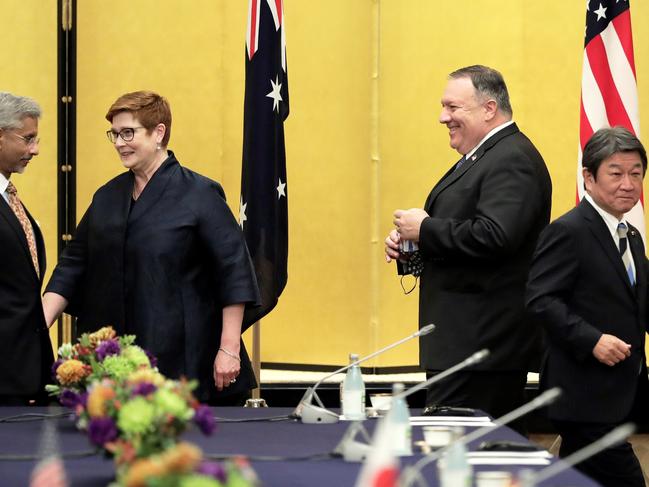Marise Payne flies to Singapore to further Quad agenda
As the pact between the US, Japan, India and Australia strengthens, new countries could be added.
Foreign minister Marise Payne has flown from a high-level Quad meeting in Tokyo to Singapore, as Australia, Japan and the US embark on a co-ordinated diplomatic push in South East Asia to counter Chinese assertiveness.
The Australian foreign minister will meet with Singapore’s Prime Minister Lee Hsien Loong and Foreign Minister Vivian Balakrishnan during her two day trip.
“My visit is an opportunity to advance Australia’s interests and reaffirm our shared commitment to promoting a stable, inclusive and prosperous region, with ASEAN at its core,” said Ms Payne in a statement.
Japan’s new Prime Minister Yoshihide Suga could embark on a post-Quad meeting trip to Vietnam and Indonesia as early as next week, according to reports in the Tokyo press.
In a further sign of the increased co-ordination of members of the quadrilateral security dialogue, or Quad, the United States has just lifted a 20-year ban on Indonesian Defence Minister Prabowo Subianto over alleged human rights abuses. Mr Subianto has since been invited to Washington.
Foreign ministers of the four country grouping – which also includes India – met on Tuesday in Tokyo to discuss an agenda clearly shaped by China’s increased assertiveness in the Indo-Pacific region.
In an interview given on the sidelines of the talks, US secretary of state Mike Pompeo confirmed his desire to see the Quad’s influence, and possibly membership grow, using language that confirmed many of Beijing’s deepest fears about a group it has long called an “Asian NATO”.
“Once we’ve institutionalised what we’re doing – the four of us together – we can begin to build out a true security framework,” Mr Pompeo told Nikkei Asia in a sit down interview.
Mr Pompeo called the grouping a “fabric” that could “counter the challenge that the Chinese Communist Party presents to all of us.”
Other countries, he suggested, could also become part of that fabric at “the appropriate time”.
Neither Foreign Minister Payne’s office or department would comment on the US Secretary of State’s ambition.
Australian officials have noted that the Trump administration has become publicly “more forward leaning” towards China than the other three Quad members, especially in the lead up to the presidential election.
Japanese Foreign Minister Toshimitsu Motegi said “it was important to co-operate (with) as many countries as possible that share basic values and common rules.”

The Trump administration has advocated for South Korea, New Zealand and Vietnam to join what have been called “Quad Plus” meetings.
That seven nation group met in March to discuss their health and economic responses to the coronavirus outbreak.
Head of the National Security College at the Australian National University, Rory Medcalf, said it was unrealistic for the Quad to expand “into a larger alliance like framework”.
Professor Medcalf instead said the four nation grouping could “become a core for larger alignments”.
“On an issue-by-issue basis, you can plug in others such as Vietnam, the Europeans, Indonesia, South Korea. It just depends on the issue,” he told The Australian.
Foreign policy analysts in China are alert to the backlash to the rising power’s strident approach in world affairs, which has resulted in a tighter alignment of the interests of the US, Japan, India and Australia.
“Since the [coronavirus] pandemic, in the past nine months or so, the Quad has evolved from being a loose grouping based on a vague concept to now emerging as a political and military bloc that sees China as their common challenge,” said Pang Zhongying, an international relations expert with Ocean University of China in Shandong province.
“It is not a NATO yet, but it is a development that poses a serious challenge to China’s security interests in the region,” he said in comments first published in the South China Morning Post.
China’s embassy in Tokyo responded angrily – and predictably – to Secretary Pompeo’s comments during the Quad gathering.
“Pompeo has repeatedly fabricated lies about China and maliciously created political confrontation. We once again urge the US to abandon its Cold War mentality and ideological prejudice, stop unprovoked accusations and attacks against China and treat relations with China in a constructive manner,” the embassy said in a statement.
Foreign Minister Payne’s visit to Singapore, a key Australian strategic partner in the region, will reprise many China-focused agenda items recently discussed at the Quad meeting and her private Wednesday lunch meeting with her Japanese counterpart, including opposing “maritime claims that are inconsistent with international law”.
“Australia and Singapore have a wide-ranging and cooperative relationship. We will focus on our nations’ work together, including in responding to the significant health, economic and security challenges facing the international community and our region due to COVID-19,” she said.







To join the conversation, please log in. Don't have an account? Register
Join the conversation, you are commenting as Logout